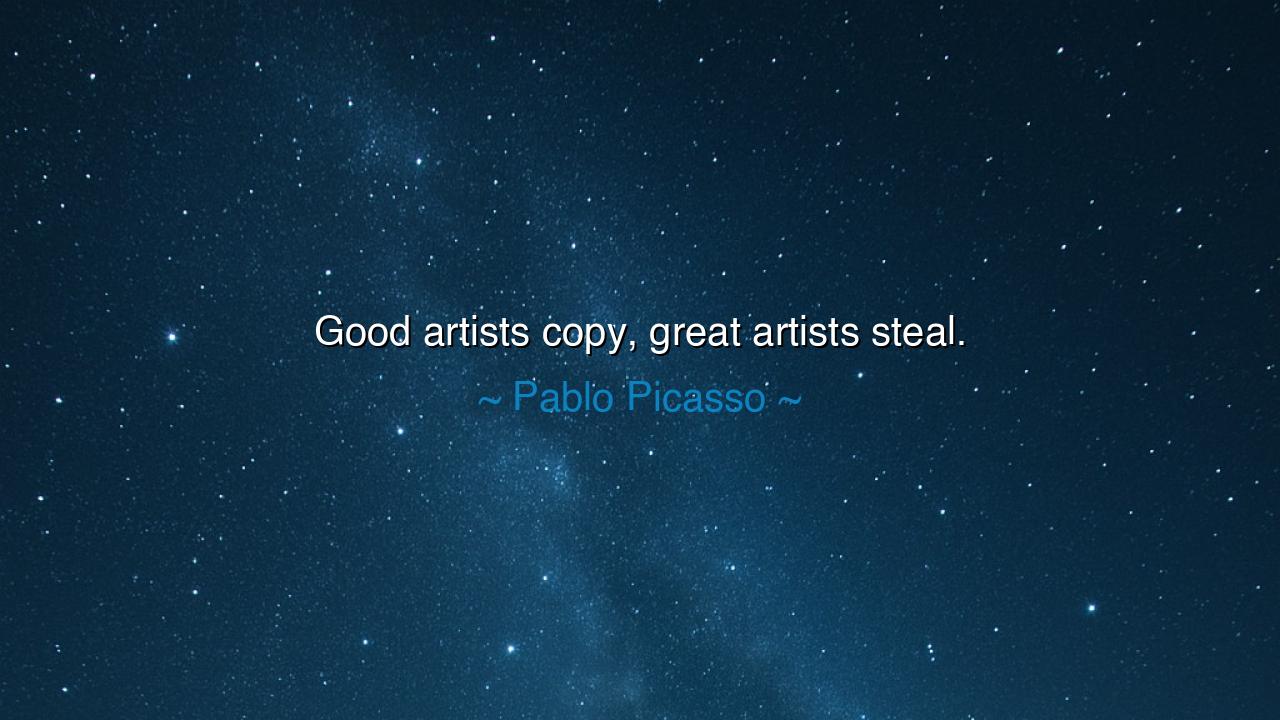
Good artists copy, great artists steal.






"Good artists copy, great artists steal." — Pablo Picasso
In this bold and mysterious saying, Pablo Picasso, the great master of modern art, reveals a truth that cuts to the very heart of creativity. His words are not an invitation to deceit, but to transformation. When he says, “Good artists copy, great artists steal,” he speaks of the difference between imitation and inspiration, between repetition and rebirth. To copy is to mimic the surface of another’s creation; to steal, in the sense Picasso meant, is to take the soul of an idea and make it wholly one’s own—to absorb it so completely that it is reborn under a new light, carrying a new spirit. The great artist does not merely borrow—he claims, he transfigures, he creates anew.
The origin of this quote, though often attributed to Picasso, may have roots even deeper in the stream of artistic tradition. The poet T. S. Eliot once wrote, “Immature poets imitate; mature poets steal.” Centuries before him, the Roman writer Virgil drew from Homer, and yet his Aeneid became its own immortal work, not a copy but a continuation of the world Homer began. Picasso’s phrase echoes this ancient lineage. It reminds us that all art, all thought, all invention arises not from nothing, but from what came before. The great artist is not ashamed to draw from others, for he knows that creativity is not about owning ideas—it is about awakening them in new forms.
To steal, in the artistic sense, is to see differently. It is to recognize beauty or truth where others see only repetition. The good artist may paint what he sees; the great artist paints what he feels, and in doing so, transforms what was borrowed into something that has never existed before. Picasso himself took inspiration from the African masks he saw in Paris, from the geometry of Cezanne, from the fragmented energy of modern life—and yet from these sources he birthed Cubism, a new language of form and perspective that shattered the old world of art. He did not copy their styles; he absorbed their essence and gave it back to the world as something wild, free, and utterly his own.
History is full of such noble theft. William Shakespeare, whose plays form the foundation of English literature, took many of his plots from older stories, from Italian tales, from chronicles and legends. Yet none who read Hamlet or Macbeth mistake them for secondhand work. In his hands, borrowed tales became living truths, pulsing with new breath. Shakespeare’s genius lay not in inventing the skeleton of story, but in clothing it with the flesh of poetry, the heartbeat of humanity. Like Picasso, he understood that to steal in art is to resurrect the past into the present—to turn memory into revelation.
And so, Picasso’s words remind us that creation is never pure isolation. Every idea is born from another; every spark descends from an older flame. The great artist is not ashamed of influence—he honors it. What makes him great is not that he borrows, but that he transcends. He takes the raw material of others’ thought and fuses it with his own vision, his own soul. In doing so, he transforms theft into alchemy, imitation into immortality. For the one who steals in this way does not diminish the original—he magnifies it, expanding its life through the light of his own imagination.
Yet there is a warning within this wisdom. To copy is easy—it requires no courage. But to steal as Picasso means it demands audacity, labor, and deep understanding. The artist must first empty himself of vanity, so that he may truly grasp the heart of another’s work. Then, through patience and craft, he must rebuild it in his own voice, purified and renewed. It is not enough to take form; one must take meaning. It is not enough to mimic genius; one must transform it through the fire of one’s own soul.
So, my child of the future, heed this teaching: do not be afraid to learn from others, but do not remain in their shadow. Study the masters, but do not become their echo. Take what they have given the world, and make it live again through your own hands, your own eyes, your own truth. Let influence be your foundation, not your prison. For as Picasso teaches, the difference between a good artist and a great one is not the presence of imitation, but the presence of transformation. To copy is to repeat what has been done; to steal is to create what must yet be born. And in this noble theft—the theft of beauty, of meaning, of vision—lies the secret of all enduring art.






AAdministratorAdministrator
Welcome, honored guests. Please leave a comment, we will respond soon